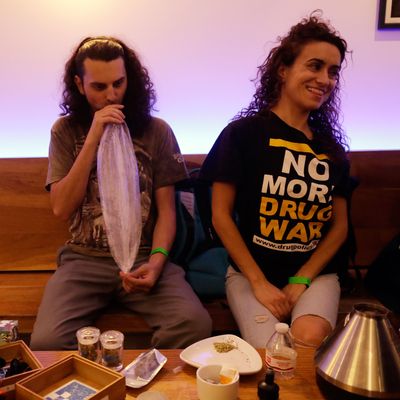
California and the Trump administration are developing a relationship of mutual hostility that is growing more intense each day. Golden State lawmakers are bristling at the new administration’s immigration policies and pledging defiance in the face of Trump’s attacks on “sanctuary cities.” The state’s climate-change activists are equally determined to fight the new boss in Washington and his oily friends. Silicon Valley is potentially an important source of corporate resistance to Trumpism. Talk of a “Calexit” from the U.S. is no longer just a gag.
Trump himself is bringing back memories of 1960s Cali-centric culture wars with threats against the University of California, Berkeley, for failing to use force against protesters who stopped an appearance by Daddy’s little provocateur, Milo Yiannopoulos.
But all this friction could get a lot worse if Trump’s likely-to-soon-be-confirmed Attorney General, the unrepentant Warrior on Drugs Jeff Sessions, decides to aggressively prosecute federal laws in conflict with the legalized cannabis regime California voters approved by a landslide the same day they rejected Trump’s candidacy.
Sessions dodged questions about his intentions toward jurisdictions with legal marijuana sales and/or consumption during his Senate confirmation hearings. And the issue could come to a test first in the states where legal cannabis is already up and running, like Colorado. California’s new legalized marijuana regime won’t take effect until the beginning of 2018, and snarls over licensing and tax arrangements could make that deadline slip. But already, cannabis industry leaders in what will soon be a huge market are nervous about what those California-haters in Trumpland might do, as the L.A. Times reports:
Business leaders … are betting the rapid maturity of the cannabis industry has made it too big to jail. Even before new laws took effect permitting the recreational use of pot in the massive markets of California and Massachusetts, the legitimate pot business had dwarfed its 2011 size, when the Drug Enforcement Administration was still aggressively raiding medical marijuana vendors operating legally under state laws. Since then, President Obama’s Justice Department decreed that states should have freedom to pursue their own policies, and the legalization train seemed to have left the station.
But those who have been in the business since the early days of medical marijuana caution the legions of newcomers that federal busts and seizures could quickly make a comeback.
“There are people in this administration who will crush this industry if they see the opportunity,” said Steve DeAngelo, who is considered a guru among pot entrepreneurs.
For the time being, though, this is one industry — and in general one whole state — where the prospect of lower taxes and less regulation are not arousing much business enthusiasm. At the moment, odds are, taking on the growing majority of Americans with no taste for drug wars is such a political nonstarter that the feds will continue to let states that legalize weed go their own ways. But the temptation for Trump and Sessions to punch hippies may be just too strong for them to resist.






























